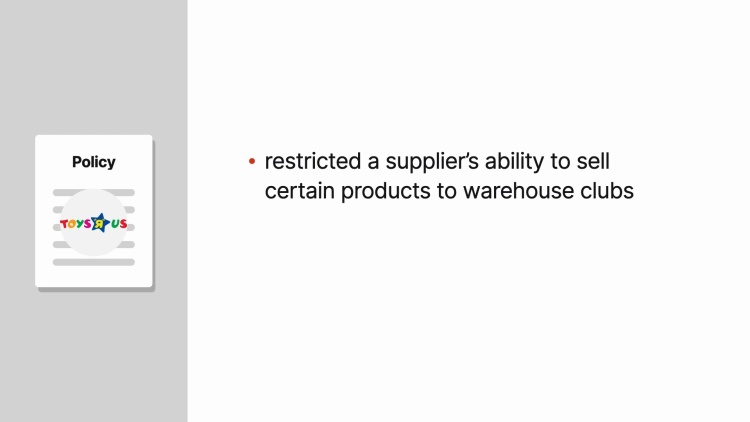Toys “R” Us, Inc. v. Federal Trade Commission
United States Court of Appeals for the Seventh Circuit
221 F.3d 928 (2000)
- Written by Tom Syverson, JD
Facts
Toys “R” Us, Inc. (Toys R Us) (defendant) was a major toy retailer responsible for approximately 20 percent of all toy sales in the United States. Beginning in the late 1970s, low-price warehouse clubs began competing with Toys R Us. By the early 1990s, toy manufacturers were looking to reduce their dependence on Toys R Us, and warehouse clubs were steadily increasing their share of the toy-selling market. In 1992, Toys R Us entered a series of individual vertical agreements with toy manufacturers. The manufacturers individually agreed to restrict distribution of toys to warehouse clubs and give Toys R Us preferential treatment. Afterward, the warehouse clubs’ market share shrunk. The Federal Trade Commission (FTC) (plaintiff) sued Toys R Us, alleging the vertical agreements violated the Sherman Act and § 5 of the Federal Trade Commission Act. The FTC also claimed Toys R Us had facilitated a horizontal boycott, or group refusal to deal, among toy manufacturers. The Toys R Us merchandising president had told some manufacturers that other manufacturers were agreeing to boycott the warehouse clubs. Toys R Us claimed this evidence was insufficient to show that it had facilitated a horizontal conspiracy. Toys R Us also argued the vertical agreements were necessary to protect against the warehouse clubs’ free riding on retail services provided by Toys R Us. The FTC entered an order against Toys R Us, and Toys R Us appealed.
Rule of Law
Issue
Holding and Reasoning (Wood, J.)
What to do next…
Here's why 904,000 law students have relied on our case briefs:
- Written by law professors and practitioners, not other law students. 47,100 briefs, keyed to 995 casebooks. Top-notch customer support.
- The right amount of information, includes the facts, issues, rule of law, holding and reasoning, and any concurrences and dissents.
- Access in your classes, works on your mobile and tablet. Massive library of related video lessons and high quality multiple-choice questions.
- Easy to use, uniform format for every case brief. Written in plain English, not in legalese. Our briefs summarize and simplify; they don’t just repeat the court’s language.





